|
Printables |
PowerPoints |
Online exercises |
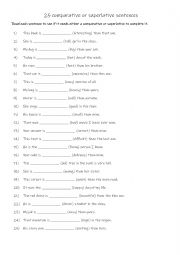
|
Comparative or superlative sentence practise 1 A
Students read each sentence to see if it needs either a comparative or superlative to complete it. Answers on page 2. In worksheet 1 B there is a generic speaking reinforcement activity using 25 of the base form adjectives in this worksheet.
Level: elementary
Age: 9-100
Type: worksheet
Downloads: 128
|
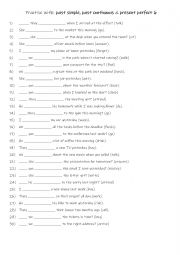
|
A1+ A2 Practise with past simple, past continuous & present perfect 6
First, students need to familiarise themselves with the 3 tenses and their use. Then they read the sentences to work out which one is needed to complete the gap-fill using the given verb in (). Each tense is used 9 times! Answers on page 2
Level: elementary
Age: 7-100
Type:
Downloads: 130
|
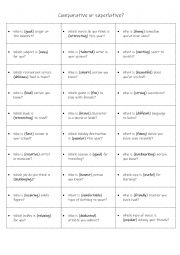
|
B1 30 comparative or superlative questions
This worksheet contains 30 generic but interesting questions for students to be able to practise using comparatives and superlatives. It enables students to give their opinions on various current topics. It is suitable for both pairs and small groups.
Level: intermediate
Age: 10-100
Type:
Downloads: 132
|
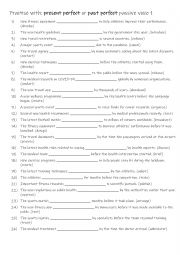
|
B1-B2 Practise with present perfect or past perfect passive voice 1
Students should learn to practise the present perfect and past perfect passive voice because these structures are vital for expressing completed actions with emphasis on the results rather than the doer. The present perfect passive (e.g., "The work has been finished") is used to discuss actions that affect the present, while the past perfect passiv...
Level: intermediate
Age: 10-100
Type:
Downloads: 115
|
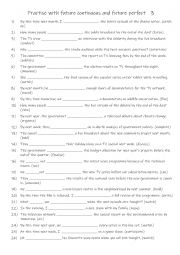
|
A2-B1 Practise with future continuous and future perfect 3
First Students familiarise themselves with the 2 tenses and their use. Then they read the sentences to work out which one is needed to complete the gap-fill using the infinitive in (). Each tense is used 13 times! Answers on page 2
Level: elementary
Age: 10-100
Type:
Downloads: 126
|
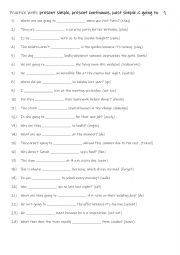
|
A1+-A2 Practice with: present simple, present continuous, past simple & going to 1
Students should practise present simple, present continuous, past simple, and going to because these tenses are essential for expressing habits, actions, past events, and future plans. They enable clear and confident communication in everyday situations, help build fluency, and provide a strong foundation for learning more advanced grammar. Masteri...
Level: elementary
Age: 8-100
Type:
Downloads: 112
|
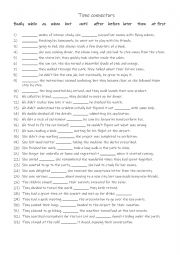
|
A2+-B1 11 Time connectors:finally,while,as,when,but,until,after,before,later,then & at first
Students read the sentences and complete the gap-fill with a suitable time connector. Each conjunction is used 3 times. Answers on page 2.
Level: intermediate
Age: 8-100
Type:
Downloads: 114
|
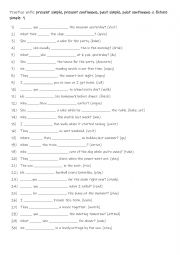
|
A1-A2 Practise with present simple, present continuous, past simple, past continuous & future simple 1
Students need to use present simple, present continuous, past simple, past continuous, and future simple to communicate effectively and express time-related ideas clearly in English. The present simple is used for routines, habits, and facts, while the present continuous describes ongoing or temporary actions. The past simple narrates completed eve...
Level: elementary
Age: 8-100
Type:
Downloads: 111
|
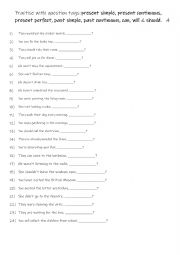
|
A2+-B1 Practise with question tags present simple, present continuous, present perfect, past simple, past continuous, can, will & should. 4
Students familiarise themselves with the tenses and modal verbs, then they read the sentences to work out which one is needed to complete the gap-fill. Answers on page 2.
Level: intermediate
Age: 10-100
Type:
Downloads: 113
|
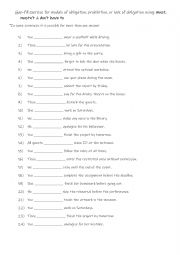
|
A2-B1 Gap-fill exercise for modals of obligation, prohibition, or lack of obligation using
Students familiarise themselves with the 3 modal verbs and their uses. They then read the sentences to see which modal verb is required to complete the gap-fill. Each modal is used 8 times. Answers on page 2.
Level: intermediate
Age: 9-100
Type:
Downloads: 118
|
|
|
|
|












